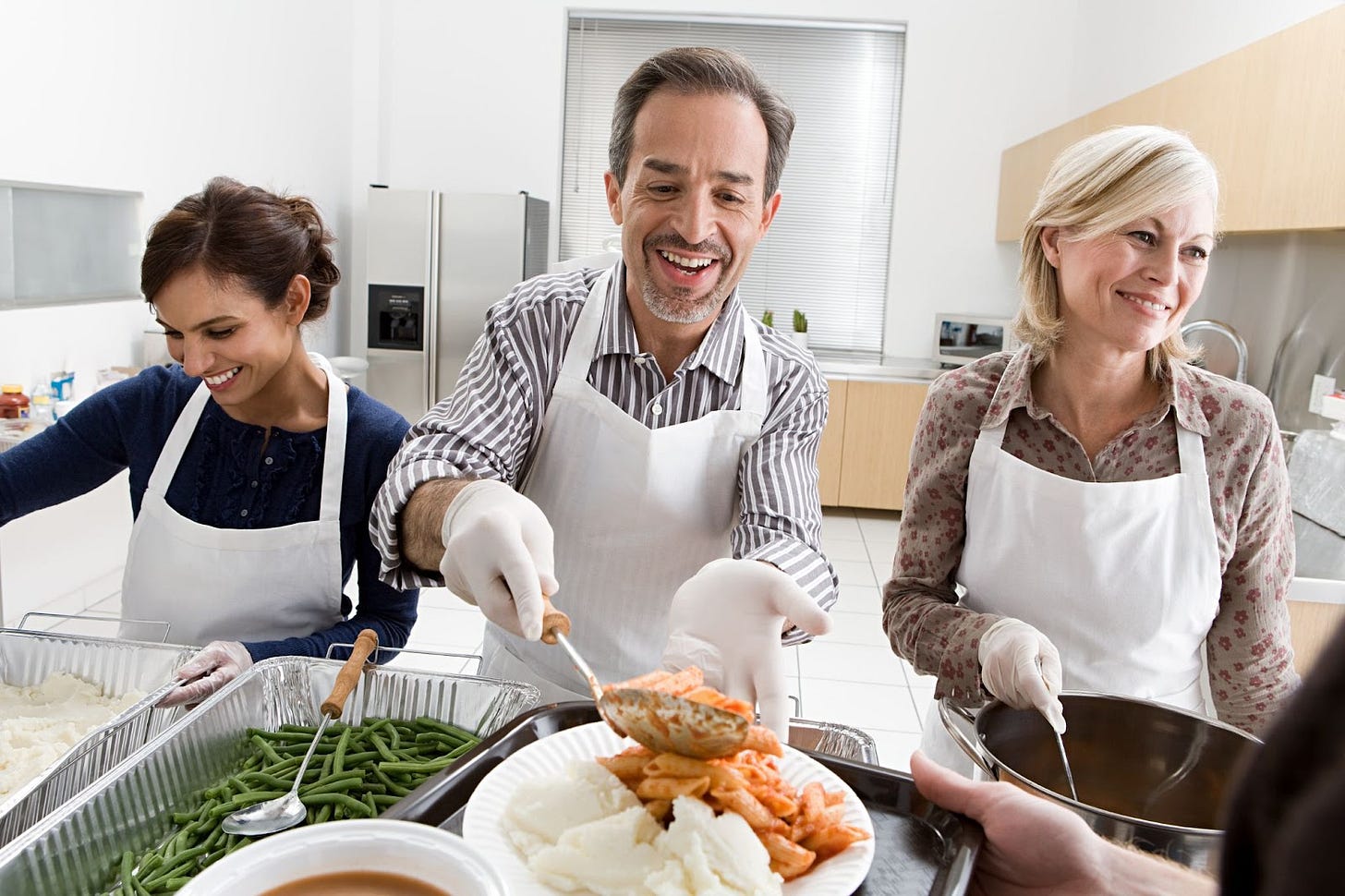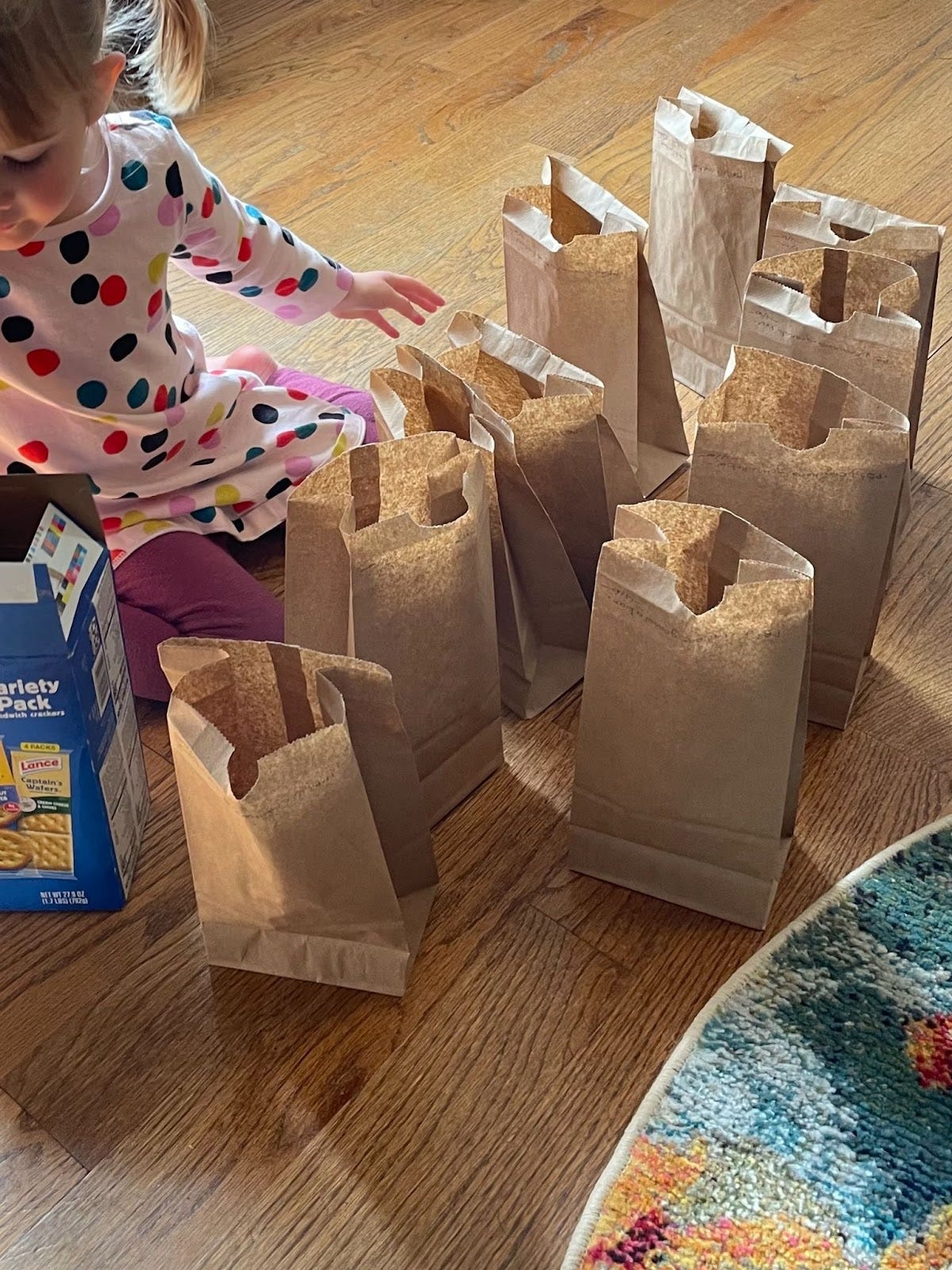As I approach 40, I’m embarking on a year-long project to reflect on the lessons I’ve learned in four decades of life. This is lesson #18. You can read the full series here.
If you asked my mom or brother what I was like as a teenager, they would tell you I had a lot of Big Feelings. If pressed, they might even divulge that I wasn’t the best at managing them. Minor disappointments led to major meltdowns, embarrassing moments sent me spiraling, and breakups left me questioning my existence. I spent a lot of time in my head, trying to sort through it all.
Now, I’m a 39-year-old woman with a newsletter about navigating life’s ups and downs. I spend a lot of time putting words to paper, trying to sort through it all. (Has anything really changed? Let’s set that question aside for another day!)
When I was a moody teenager, my mom — my wonderful, patient mom — would listen to my myriad woes and always offer the same advice: When you’re feeling lost, help someone else. She’d reassure me that by helping others, I’d get out of my own head and gain perspective. Chances are, she’d tell me, my problems weren’t as insurmountable as they seemed.
As much as 15-year-old me hated to admit it, she was right. Time and again, helping others has stopped me from ruminating and given me the perspective I needed. Decades later, her words still guide how I live my life.
I’m very much still someone with Big Feelings — someone who goes through bouts of depression and existential malaise, someone who cares deeply and worries often. I’m partly embarrassed to admit this (shouldn’t I have cracked the code to contentment by now?), but I’m also proud that I’ve accepted who I am, in part by putting my mom’s words into action. Yes, I often feel lost. And yes, I often find my way by helping others.
In the past few weeks, disaster has struck uncomfortably close to where I live. Hurricane Helene devastated wide swaths of Florida, Georgia, Tennessee, and the Carolinas. Atlanta was spared the worst, but last week, a nearby chemical fire made the air hazy and reek of chlorine. It felt apocalyptic. My attention ping-ponged from one disaster to the next — checking in on friends, trying to decipher local air quality guidance, and struggling to process how overwhelming it all felt. I swung from feeling anxious to depressed, and tried to mask it when caring for my child or meeting with colleagues. It was exhausting.
All the ping-ponging and apocalypse-worrying left me feeling hopeless. I cried a lot. I picked fights with Billy. I complained to unsuspecting friends. Finally, I remembered my mom’s words. It was like a lightbulb went off, illuminating the dark room I’d crawled into.
I gave recommendations to friends of friends who had evacuated from Asheville to Atlanta. I took on extra work for a colleague in North Carolina who had lost power. I signed up to help organize our neighborhood’s free costume closet. I joined a volunteer group preparing the grounds for a pumpkin sale at my daughter’s school. I made and delivered another set of lunches for unhoused neighbors. I wrote these words.
Did these actions help others? Yes. Did they help me? Absolutely. Did they make a big difference in the grand scheme of things? No. But that’s not the point. These small deeds weren’t just about doing good — they helped me move from feeling helpless to being helpful. They allowed me to reclaim a small sense of control, a small bit of hope, in a world that felt overwhelming. Now, as Hurricane Milton bears down on a weary Florida, I’m trying to keep this lesson top of mind.
In A Paradise Built in Hell: The Extraordinary Communities That Arise in Disaster, the imitable Rebecca Solnit explains that the ideal societies we dream of aren’t as unreachable as we think. “What if paradise flashed up among us from time to time — at the worst of times?” she asked. “What if we glimpsed it in the jaws of hell?”
When disaster strikes, the helpers are easy to find. First responders, volunteers, and neighbors are out in full force, searching for survivors, delivering food and water, and offering shelter. They provide both help and hope, simply because they feel called to.
If going through my own personal hell of losing my spouse taught me anything, it’s that people want to help when they witness someone else in pain. I know what it feels like to want to do something. I know you do, too. Instead of sitting with our own worries and guilt, it feels immeasurably better to take action — to help in whatever way we can.
If this was a typical essay, I’d continue reflecting on helping others. I’d write and think, think and write. But thinking (and writing) only gets you so far. Trust me on this.
At some point, we need to get up and take action. To move our bodies, touch grass, and support people less fortunate than ourselves. Donating money always helps — but I prefer to pair financial donations with tangible actions. It gives my anxiety someplace to go.
Plenty of people need help right now, and there are lots of useful resources online offering ways to help those currently affected by natural disasters, war, or other humanitarian crises. Helping in times of disaster is wonderful and much-needed, but what if, as Rebecca Solnit wondered, we helped others all the time?
“It's tempting to ask why if you fed your neighbors during the time of the earthquake and fire, you didn't do so before or after,” she wrote. “Disaster shocks us out of slumber, but only skillful efforts keeps us awake.”
Here are a few ideas to help you stay awake:
Donate blood: This is a perennial way to help others. In the U.S., the American Red Cross makes it easy to search for local drives. In Canada, Canadian Blood Services hosts over 13,000 blood donation events a year.
Make one big meal: Every few months, my mom makes dinner for the unhoused families and children staying at Hagar’s House, a local emergency shelter. There are shelters like this worldwide, and if you like to cook, this is a wonderful way to assist.
Or lots of smaller meals: I regularly make bagged lunches to leave in our community closet. Labeling bags, making sandwiches, and sorting snacks is a great way to keep my hands busy. (It beats mindless scrolling!) Seeing the gratitude on neighbors’ faces when I deliver those lunches makes the effort even better.
Become a Big: My late husband Jamie volunteered with Big Brothers, Big Sisters. It’s a beautiful way to mentor children and offer support they may not otherwise have.
Do laundry: My partner Billy is organizing an event here in Atlanta making it possible for lower-income families to wash their clothes and linens for free. You can donate here.
Join a local outdoor cleanup: Community parks and outdoor spaces always need volunteers to spread mulch, pick up trash, or pull weeds. Introverts: this is the volunteer version of doing the dishes at a dinner party. You get to be social, but don’t have to do lots of talking!
Identify a cause you care about: What keeps you up at night? Gun violence? Climate change? Voting rights? Joining groups like Everytown, Citizens’ Climate Lobby, and Fair Fight, for example, can give you an outlet to channel your worries into action. It won’t solve everything, but it might help to meet others who care as much as you do.
I’d love it if you shared some of your favorite ways to support others in the comments. What ways of helping also help you?
When you’re feeling lost, help someone else. Thanks, mom. It’s a really good lesson.
xoxo KHG








The way you give your time, even when you don't have much to give, is ever inspiring to me.
Katie, this is so on point. There are tons of ways to get involved via your local school, even if you don't have anyone attending any more. Most would love volunteers to read with the students or share other knowledge. The libraries are also a good place to become involved. Ours has things like Read for Life, and adult literacy program that has in the last couple of years become heavily used for immigrants who don't speak English. Keep up the good work!